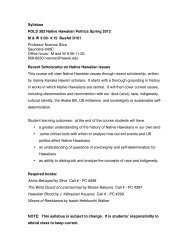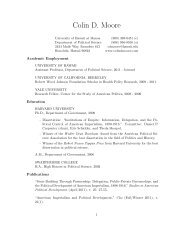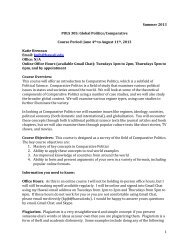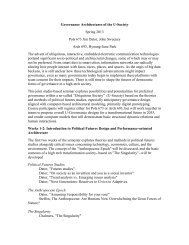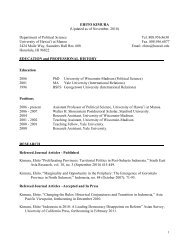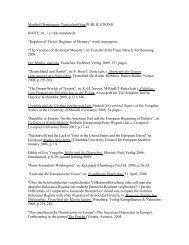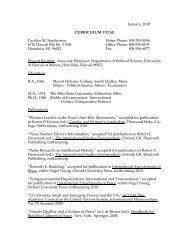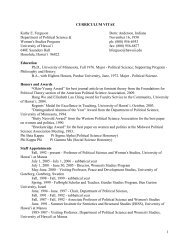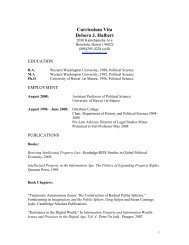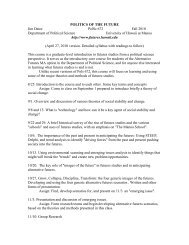2011 graduate student guide - Department of Political Science ...
2011 graduate student guide - Department of Political Science ...
2011 graduate student guide - Department of Political Science ...
You also want an ePaper? Increase the reach of your titles
YUMPU automatically turns print PDFs into web optimized ePapers that Google loves.
DEPARTMENT OF POLITICAL SCIENCE GRADUATE STUDENT GUIDE<br />
Specializations<br />
No`eau Peralto and Kaleo Wong, <strong>student</strong>s participating in the Indigenous Politics/<br />
Indigenous Governance exchange in Victoria, British Columbia, present makana (gifts)<br />
to Salish artist Charles Elliot and his son. (photo by Kahikina de Silva)<br />
4. Specializations<br />
The <strong>Department</strong> <strong>of</strong>fers a unique educational<br />
environment and path to <strong>graduate</strong> level education. Our<br />
curriculum reflects a critical approach to the discipline<br />
and has created room for innovative and cutting edge<br />
scholarship. The subfields embraced by the<br />
department include both traditional ones as well as<br />
opportunities to study politics through a lens that can<br />
be found in no other political science department in<br />
the United States. The faculty, many <strong>of</strong> whom are<br />
internationally recognized for their scholarly<br />
contributions, seek to create an environment for<br />
<strong>graduate</strong> education that facilitates innovative<br />
scholarship using a multitude <strong>of</strong> different types <strong>of</strong><br />
methodologies.<br />
Students are encouraged to broaden their perspectives<br />
by taking courses in other departments and through<br />
many interdisciplinary programs associated with the<br />
University such as Asian Studies and the Pacific Islands<br />
Program.<br />
The <strong>Department</strong> <strong>of</strong>fers specializations in the following<br />
areas:<br />
Alternative Futures: The political science department<br />
hosts one <strong>of</strong> the only political futures specializations in<br />
the United States with an M.A. concentration in Futures<br />
Studies. The emphasis is on political futures, political<br />
design, and alternative futures building. The<br />
specialization is premised on the fact that industrial<br />
societies are undergoing such extensive and rapid<br />
change that it is impossible to map out the future<br />
simply by extending knowledge <strong>of</strong> the past or<br />
experiences <strong>of</strong> the present. The futures option seeks<br />
to forecast things to come, using theories <strong>of</strong> social<br />
structure and change, examining the causes and<br />
consequences <strong>of</strong> transformation, leading to the<br />
construction <strong>of</strong> alternative images <strong>of</strong> possible futures.<br />
Comparative Politics: The comparative study <strong>of</strong><br />
politics is an integral part <strong>of</strong> the political science<br />
discipline. At UH, our comparativists explore the<br />
differential development <strong>of</strong> politics, economics, and<br />
society in various "areas" <strong>of</strong> the world. Some <strong>of</strong> the<br />
issues studied include (a) models <strong>of</strong> development and<br />
their varied impacts on different classes, regions,<br />
genders, and cultures; (b) the processes <strong>of</strong><br />
liberalization and democratization that have been<br />
reshaping the post-cold-war world; (c) the resurgence<br />
<strong>of</strong> ethnic, religious, and other movements that seem<br />
both derivative from and responses to modernity; (d)<br />
the continued relevance <strong>of</strong> colonialism and<br />
militarization in today's world; and (e) questions <strong>of</strong><br />
identity and otherness in postcolonial societies. The<br />
<strong>Department</strong> has a particular emphasis on regions <strong>of</strong><br />
the Pacific and Asia.<br />
Conflict Resolution: The focus on conflict<br />
resolution brings together theories and methodologies<br />
<strong>of</strong> political science, social science, the humanities, and<br />
law with the skills and techniques <strong>of</strong> dispute<br />
resolution, particularly mediation and conciliation.<br />
The goal is to give the <strong>student</strong> an understanding <strong>of</strong><br />
the dynamics <strong>of</strong> conflict resolution from comparative,<br />
historical, and theoretical perspectives.<br />
Indigenous Politics (IP): The study <strong>of</strong> indigenous<br />
politics in Hawaiʻi starts with and is anchored to<br />
Kānaka ʻŌiwi Hawaiʻi, the indigenous people <strong>of</strong> our<br />
islands. Our program considers indigeneity a political<br />
category that recognizes both the connection <strong>of</strong><br />
autochthonous peoples to our lands and the<br />
international alliances and interconnections amongst<br />
peoples who identify as indigenous. Students in this<br />
program will examine the breadth and dynamism <strong>of</strong><br />
the issues and movements that constitute the field <strong>of</strong><br />
indigenous politics.<br />
Page 8


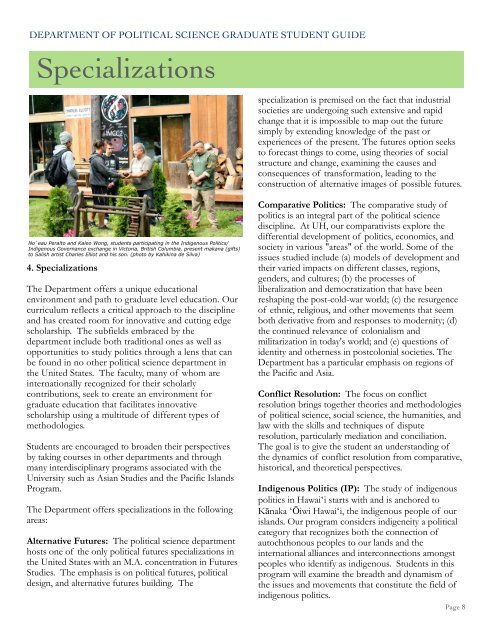
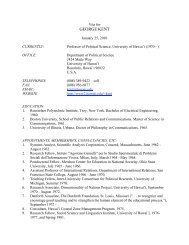
![Fall 2012 POLS 620 Syllabus [PDF] - Department of Political Science](https://img.yumpu.com/25416938/1/190x245/fall-2012-pols-620-syllabus-pdf-department-of-political-science.jpg?quality=85)
